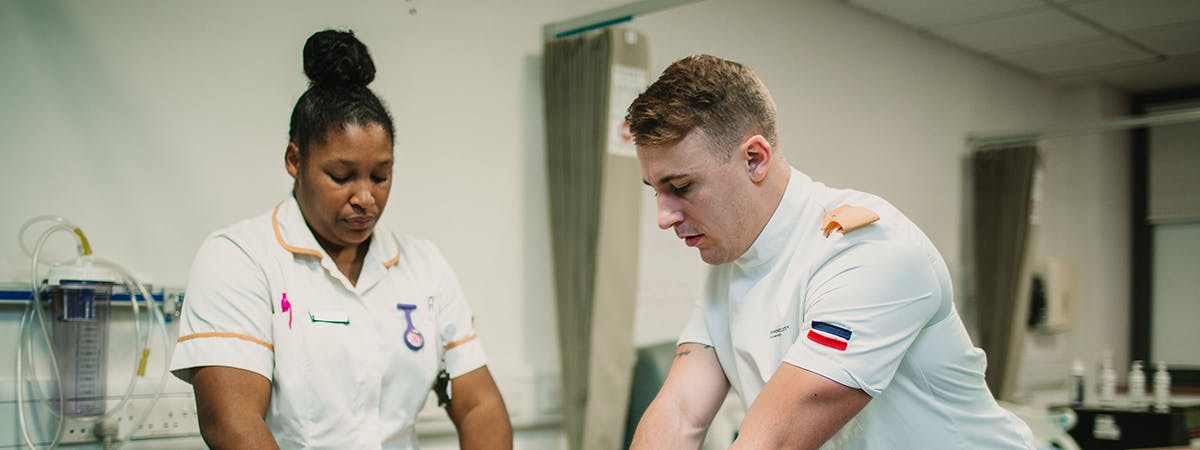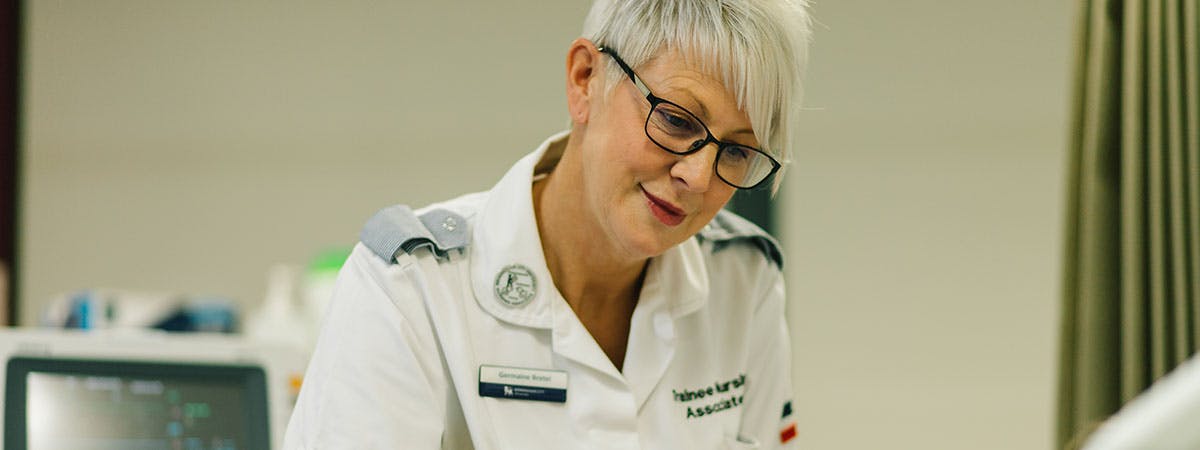Going from being a student to being a nurse can be a challenge, many of you will be taking this step before you have graduated in a time of great demand and sorrow within the health services. It is normal to be anxious about this step at the best of times, Senior Lecturer in Mental Health Nursing, Kim Moore has put together some tips on how to look after yourselves physically and emotionally.

Your physical health
Looking after yourself
- PPE and infection control are critical elements of the care provision you will be working within
- Make sure that you maintain good standards, use the PPE equipment given to you (where you have access to this) and wash your hands frequently
- It will also be useful to have a good moisturiser for your hands that you can use to keep your skin healthy good hydration will help keep skin healthy as well, so keep drinking water where you can
Hydrate well
You are going to be busy so it is going to be important that you hydrate well. Drink plenty of water or juice to keep you going. You will, I am sure at some point want Caffeine to help with staying alert, but keep an eye on your intake as this may interrupt your sleeping patterns.
Nutrition
It is important to maintain a good diet with regular meals. This may be difficult given the demands of practice, however it is vitally important that you eat well. Many hospitals are now being supported with provision of fruit and meals, so use these to make sure you have regular meals and you can make use of the dedicated shopping hours for NHS staff.
Getting enough rest
Sleep could be an issue, you may well be working long days and see some difficult situations. Being overtired can mean you make mistakes, so it is important to get quality sleep.
Switching off from the work day could be an issue to consider:
- Using some form of meditation such as yoga, tai chi or muscle relaxation exercises
- Listen to some relaxing music
- Soak in a warm bath to help you relax, pamper yourself and encourage rest
- Sometimes writing down your thoughts and feelings can help clear your mind, and this is where writing a reflection may be useful to you
- You might want to use an online chat to help get some of the issues of your mind
- Try not to have your digital media in bed with you to help your mind switch off, however there are some good sleep aid apps that you can download to your phones which can be helpful and are free

Emotional wellbeing
You are entering into the clinical workplace at a time of immense stress, being anxious is a normal and healthy response to what is happening around you. You are likely to see the best and worst of people at this time and that can be emotionally very difficult. The most common emotions you may experience at work could include:
Frustration and anger
This could be from the patients or their relatives, from staff and colleagues who may feel overwhelmed or exhausted, in most cases this is not a personal attack although it may feel like this. What you might want to do if you are feeling frustrated is:
- Talk to someone about how you are feeling, you may not be the only one feeling this way and talking helps
- Don’t button it up – holding on to emotions like frustration and anger is both physically and emotionally draining. It adds to our stress loads
- If your workplace has a wobble room – go and use it yell, scream or shout – this is what they are for
- Use your energy and dance – this helps burn off additional energy and helps you concentrate better. Learn a new dance with colleagues – there are plenty to choose from on the internet
Sadness
Staff working in respiratory care, intensive care and nursing homes are confronted with the death of their patients on a very regular basis. Under the current constraints in many cases the person is alone and not able to have family with them. Being the nurse or carer who supporting a person at the end of life, perhaps someone who cannot breathe is a difficult and emotional time, this may be made more difficult by the lack of touch you are able to give them due to PPE.
There will be times when you need to cry and this is okay, it is healthy. If you are feeling overwhelmed, do not bottle this up – talk to someone about how you feel and do not store up guilt that does not belong to you. Do not feel ashamed or embarrassed by feeling overwhelmed by your emotions.
Blunted emotions and feelings of emotional numbness
This would be expected when you are working with complex health care issues, you are tired, hungry and feeling the loss of patients. It may seem out of place but there are many cases of nurses recording themselves dancing on the wards. This is okay, trying to find light relief, or even morbid humour is going to be a strategy some people will use to help them cope.
We do not know if there will come a time when decisions about who gets the ventilator may occur, there is speculation in the media, but we do not know if this will happen and you need to keep this in mind.
- What is really important is that you keep talking about how you feel
- Remember that you are working as part of a team, you have each other and are not alone
- Your feelings about this need to be acknowledged
The last consideration to bear in mind is being a nurse and caring for a relative or friend, someone you know personally is not recommended. If you are in this position you need to let the team know as you will be emotionally involved in their care when you need to have a professional distance.
Minimising the problem
We often feel guilty about talking about our problems, dismissing our own issues or minimising them in the light of people who are going through worse situations. It is okay to feel sad, hurt or angry about our problems and if we dismiss them or shrink them down then we are not managing these situations well and they will often reoccur at another point. So whatever happens your feelings are real and they need to be talked about or with someone who can listen and perhaps point you in the direction of more help or support if you need it.
Emotional exhaustion / compassion fatigue
When we become both physically and emotionally exhausted, this can lead to a reduction in our thoughts and feelings of empathy for others, sometime known as a secondary traumatic stress. The blunting of our empathy can be a result of working directly with people during times of traumatic events or disasters. This is particularly common in healthcare, and has been linked to professional empathy towards others.
If you are experiencing combinations of:
- Physical and emotional exhaustion
- Poor concentration
- Emotional numbness
- Feeling helpless, guilty or overwhelmed
It is important that you have someone you can talk with or to about these feelings, someone who is able to provide you with some emotional support. This could be talking with a colleague, manager, support organisation or mental health professional. There are online supports where you can discuss your emotional needs with another person, The Big White Wall is one of these resources you might consider if you want to talk anonymously about how you feel.
You are stronger than you think
With any crisis or situation that is new, you can have fleeting thoughts of not being ‘good enough’, ‘prepared enough’ or ‘I don’t know what I am doing’ – this is normal. In times of crisis we often go into automatic behaviours and we complete what we need to do, you will see this in practice, even in the worst of times we have the ability to manage at the time.
It is when the crisis is over and we can think and feel again that many of us experience psychological issues, sometimes this can be trauma such as post-traumatic stress, feeling overwhelmed by emotions or adrenaline come downs – we all have resources of emotional strengths including our ability to be emotional and talk to others about how we are feeling.
It is this strength and empathy for others that motivates you to go to help others, gets you out of bed and back into working within the current crisis.





